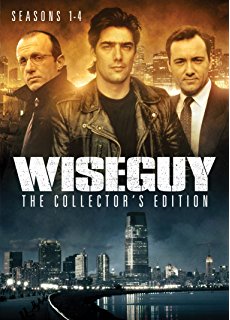What makes Wiseguy historically important was that it went against conventional episodic television: stories played out over several episodes. Neither did each arc exist in isolation, they were of part an even larger arc as the events in each story brought consequences for the next one. Unfortunately the realities of 1980s television prevented Wiseguy from developing even more complex stories.
Season One packed a wallop with two engrossing narratives featuring larger than life villains. Terranova's first assignment was to infiltrate the Atlantic City mob. Sonny Steelgrave, played with gusto by character actor Ray Sharkey, wanted to take over the city. His persona combined Donald Trump and Tony Soprano. Sonny took Vinnie under his wing and they form a close bond, causing serious loyalty conflicts for Terranova.
The second arc showed even more ambition with Vinnie fronting as a bodyguard for international arms dealer siblings Mel and Laura Profitt. Kevin Spacey got his first big break and its fascinating to see him use acting rhythms he would bring to his future roles. Mel's a drug attic who's prone to bouts of megalomania and paranoia. Another major character Roger Loccocco (William Russ), a hired gun for the Profitt siblings, also became a recurring character.
The second season continued to emphasize character. Vinnie, dejected after the chaotic conclusion to the Mel Profitt case, sulks at home until he discovers white nationalists are starting trouble in his Brooklyn neighborhood. Don't miss Fred Thompson as their titular leader, eventually revealed to be a huckster.
Next came the "Garment Trade Storyline" which featured Jerry Lewis in a rare dramatic role as garment trade business owner who gets in trouble with a mobster, a menacing Stanley Tucci. During filming Wahl was injured and briefly replaced by a veteran undercover agent John Henry Raglin, played by Anthony Denison from Crime Story.
Unfortunately the last part of season two remains unavailable on DVD and syndication, due to copyright issues. The story featured Vinnie taking on corruption in the record industry.
By season three the stories grew more erratic. The first arc returned to another mob themed story line involving Vinnie's stepfather. Next came a brilliant four episode story on power plays in Washington D.C., centering on a scheme to launch a trade war with Japan that came straight out of a Tom Clancy novel, starring Norman Lloyd as a duplicitous general.
Then the setting moved to rural Washington, foreshadowing Twin Peaks which would air the following season on ABC. Vinnie discovers shady behavior and bizarre locals while investigating a serial killer case in what began as a simple investigation into small town corruption. The case caused Vinnie to experience a nervous breakdown and he went AWOL. The season ended with Terranova stumbling upon a toxic waste conspiracy in Seattle as his mental state continued to worsen. Unfortunately the character never got a proper exit from the show's mythology.
Wahl did not return for season 4 over creative differences and the show quickly faded. Wiseguy continued on for a short season with Steven Bauer taking over as the lead. An inferior made for TV movie with Wahl aired in 1996.
So many of the most heralded shows of the 21st Century including The Sopranos, Breaking Bad, Homeland, all owe something to Wiseguy. Jonathan Banks went on to star in Breaking Bad and Better Call Saul brought a welcomed renewed interest in the show. Wiseguy's pulpy writing style and retro film noir look are well worth revisiting.


No comments:
Post a Comment